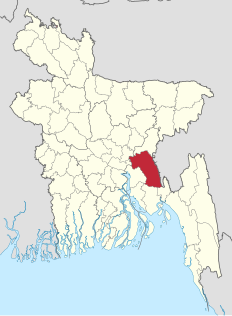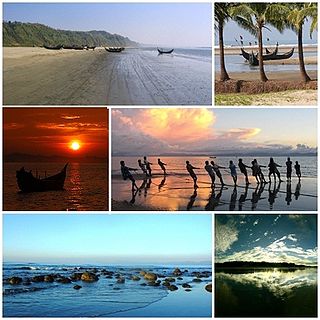Related Research Articles

Cox's Bazar is a district in the Chittagong Division of Bangladesh. It is named after Cox's Bazar town. It is located 150 kilometres (93 mi) south of Chittagong. Cox's Bazar is also known by the name Panowa. Another old name was Palongkee. The modern Cox's Bazar derives its name from Captain Hiram Cox, an army officer who served in British India. It is one of the fishing ports of Bangladesh. At Cox's Bazar is one of the world's longest natural sea beaches.

Comilla District, officially known as Cumilla District It is a district of Bangladesh located about 100 kilometres south east of Dhaka. Comilla is bordered by Brahmanbaria and Narayanganj districts to the north, Noakhali and Feni districts to the south, Tripura of India to the east and Munshiganj and Chandpur districts to the west. Comilla district is located in the south eastern part of Bangladesh.

The Rohingya people are a stateless Indo-Aryan ethnic group who predominantly follow Islam and reside in Rakhine State, Myanmar. There were an estimated 1 million Rohingya living in Myanmar before the Rohingya genocide in 2017. Described by the United Nations in 2013 as one of the most persecuted minorities in the world, the Rohingya population is denied citizenship under the 1982 Myanmar nationality law. They are also restricted from freedom of movement, state education and civil service jobs. The legal conditions faced by the Rohingya in Myanmar have been widely compared to apartheid by many international academics, analysts and political figures, including Nobel laureate Bishop Desmond Tutu, a South African anti-apartheid activist.

The Naf River is an international river marking the border of southeastern Bangladesh and western Myanmar.

Cox's Bazar is a city, fishing port, tourism centre and district headquarters in southeastern Bangladesh. It is famous mostly for its long natural sandy beach. It is located 150 km (93 mi) south of the city of Chittagong. Cox's Bazar is also known by the name Panowa, which translates literally as "yellow flower". Another old name was "Palongkee".

Teknaf is an Upazila of Cox's Bazar District in the Division of Chittagong, Bangladesh. It forms the southernmost point in mainland Bangladesh. The name of the region comes from the Naf River which forms the Eastern boundary of the upazila. It shares a border with Myanmar.

Maungdaw is a town in Rakhine State, in the western part of Myanmar (Burma). It is the administrative seat of Maungdaw Township and Maungdaw District. Maungdaw is a town of Myanmar and borders Bangladesh. Maungdaw is 16 miles away from Buthidaung. The two towns are separated by the May Yu Mountains and are connected by two tunnels built in 1918. The district around Maungdaw houses a large Royhingya population.

The neighbouring countries of Bangladesh and Myanmar had a generally cordial relationship under the Burmese military junta although the presence of over 270,000 Rohingya refugees in Bangladesh often served as a major irritant. The civil society and political class of Bangladesh often voiced solidarity for Myanmars pro-democracy struggle. However, Bangladesh has sought greater trade and road and rail networks with Myanmar to boost the economic relations between the two countries.

Shapuree, Shahpori, Shah Parir, Shapura, or Shinmabyu Island is located in Bangladesh at the mouth of the Naf River, a maritime-boundary between Bangladesh and Myanmar. Historically, it was claimed by the British during the First Anglo-Burmese War. The island forms an extension of the peninsula of Teknaf Upazila.

The Rohingya conflict is an ongoing conflict in the northern part of Myanmar's Rakhine State, characterised by sectarian violence between the Rohingya Muslim and Rakhine Buddhist communities, a military crackdown on Rohingya civilians by Myanmar's security forces, and militant attacks by Rohingya insurgents in Buthidaung, Maungdaw, and Rathedaung Townships, which border Bangladesh.

Rangabali is an Upazila of Patuakhali District in the Division of Barisal, Bangladesh. It is bordered by the Bay of Bengal to the south, and Char Fasson Upazila to the east; and by the Kalapara Upazila and Ramnabad Channel to the west, and Chalitabunia river, Agunmukha river and Char Biswas to the north.
Abdur Rahman Bodi is a Bangladesh Awami League politician and a former Jatiya Sangsad member representing the Cox's Bazar-4 constituency during 2009–2019.

Nayapara refugee camp is a refugee camp in Teknaf, Cox's Bazar, Bangladesh. It is located next to the village of Dhumdumia and is inhabited mostly by Rohingya people that have fled from religious persecution in neighboring Myanmar. It is one of two government-run refugee camps in Cox's Bazar, the other being the Kutupalong refugee camp. The two refugee camps had a combined population of around 30,000 refugees in July 2017. In September 2017, the United Nations High Commissioner for Refugees (UNHCR) estimated that the combined population of the two refugee camps had increased to over 77,000. As of 14 January 2018, the estimated population of Nayapara refugee camp is around 23,065.
Nhilla Union is a union, the smallest administrative body of Bangladesh, located in Teknaf Upazila, Cox's Bazar District, Bangladesh. The total population is 37,902.
Sabrang Union is a union, the smallest administrative body of Bangladesh, located in Teknaf Upazila, Cox's Bazar District, Bangladesh. The total population is 46,512. In September 2017, 6 Rohingya Refugees died while trying to enter Bangladesh after their boat drowned.

On 25 August 2017, Hindu villages in a cluster known as Kha Maung Seik in the northern Maungdaw District of Rakhine State in Myanmar were attacked and 99 Bengali Hindu villagers were massacred, allegedly by Muslim insurgents from the Arakan Rohingya Salvation Army (ARSA). A month later, the Myanmar Army discovered mass graves containing the corpses of 45 Hindus, most of whom were women and children.
Leda makeshift settlement is a refugee camp constructed for Rohingya refugees on government-owned land in Nhilla Union of the Teknaf sub-district in Cox's Bazar, Bangladesh. The camp is located some 15 km (9.3 mi) from Teknaf town.
Methamphetamine in Bangladesh is an illegal substance that is often consumed in the form of Yaba. Yaba is a drug made by combining methamphetamine and caffeine. They are sold as colorful pills. There are three forms of Yaba in Bangladesh, they are R-7, Controller, and Champa.

The 1994 Bangladesh cyclone was a powerful and tropical cyclone in the Bay of Bengal. The cyclone closely followed the path, strength, and time of year of a deadly cyclone in 1991 that killed more than 138,000 people. The 1994 cyclone formed on April 29 as a depression, which organized and intensified significantly over the subsequent few days. On May 2, the cyclone attained winds of 215 km/h (130 mph), according to the India Meteorological Department (IMD). That day, the storm made landfall in southeastern Bangladesh, and rapidly weakened over land, before dissipating on May 3.
The 2010s was a decade of the Gregorian calendar that began on January 1, 2010, and ended on December 31, 2019. For Bangladesh this decade was characterized by political stability from continued rule of Sheikh Hasina led Awami League Government. While the country made significant economic growth in this decade, rising threat from Islamist terrorism and Rohingya refugee problem marred the progress.
References
- ↑ "Teknaf Upazila". en.banglapedia.org. Banglapedia. Retrieved 12 September 2017.
- ↑ Tani, Masakazu; Rahman, Md Abiar (2017). Deforestation in the Teknaf Peninsula of Bangladesh: A Study of Political Ecology. Springer. p. 104. ISBN 9789811054754 . Retrieved 12 September 2017.
- ↑ "146 Rohingyas sent back to Myanmar". New Age. Retrieved 12 September 2017.
- ↑ "ATTACK ON ROHINGYAS: 'It is horrifying'". dhakatribune.com. Retrieved 12 September 2017.